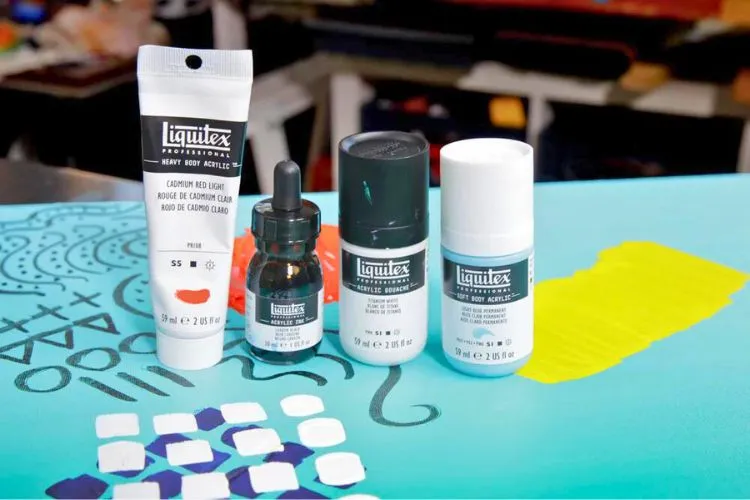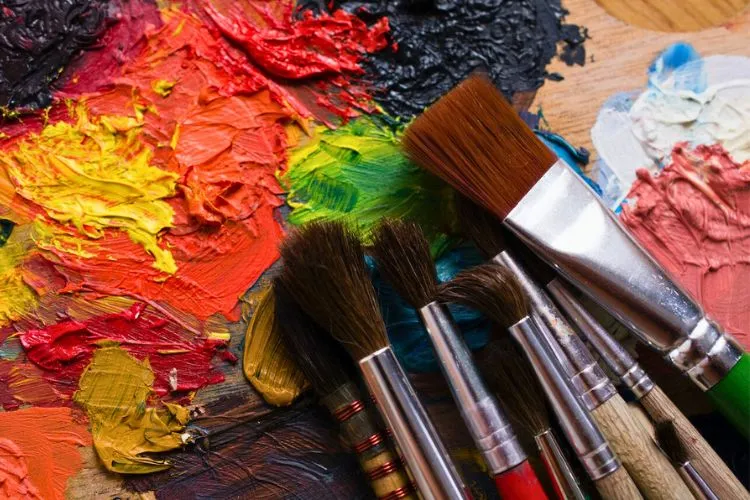Considered a staple in art studios, acrylic paints are widely recognized for their diverse color spectrum and application versatility.
However, their potential impact on animal welfare often goes unnoticed.
So, is acrylic paint cruelty free?
This article aims to shed light on this overlooked aspect. We will explore if and how these paints intersect with the burgeoning trend of ethical consumerism, providing a thorough investigation into their composition and manufacturing process.

Ultimately, we strive to offer insight into whether acrylic paints meet the evolving definitions of cruelty-free and vegan standards.
Is acrylic paint cruelty free?
Acrylic paint is not entirely cruelty free. The production of standard acrylic paints utilizes parts of animals, except for the fur.
Consequently, these paints may contain gelatin, a key ingredient derived from various sources, including animals.
However, there is a divergence in the market, and some brands advertise their products as 100% cruelty-free.
These brands have presumably found alternative, non-animal-based components to replace traditional ingredients.
Therefore, while some brands of acrylic paints can be considered cruelty-free, others do not meet this criterion. To ensure no animals were harmed in the making of your acrylic paints, it’s best to opt for products explicitly marked as cruelty-free or vegan.
Are acrylic paints tested on animals?
Acrylic paints, a cornerstone nearly ubiquitous in arts and crafts, do not typically involve direct animal testing.
However, this does not necessarily indicate that they are entirely cruelty-free. The conundrum lies in the substances contained within these paints.
Certain pigments, additives, or preservatives used in acrylic paints might have originally been tested on animals for toxicity and safety.
This practice is not exclusive to the art industry and happens across various sectors where chemicals or new products are involved.

In addition, some paints may contain animal-derived ingredients like Bone Black, a pigment made of carbonized cattle bones, but these constituent parts do not necessitate additional animal testing specifically for the paints.
However, this general view may vary across brands. Some may have alternative testing methods that don’t involve animals or use only synthetic or plant-based substances.
There are also companies creating vegan art supplies, which exclude any elements originating from animals and don’t support animal testing.
Therefore, while most acrylic paints may not be tested on animals, to be sure of a product’s cruelty-free status, it’s essential to research on the ingredients used and the manufacturer’s policies on animal testing.
Vegan Acrylic Paint Brands
While traditional acrylic paints may use animal derivatives, several brands focus on formulating their acrylics to be vegan-friendly. Below are a few such brands:

Liquitex
Liquitex, a renowned brand among artists, offers a range of cruelty-free and vegan acrylic paints. They focus on delivering highly pigmented, expert-grade paints and have a strong commitment to sustainable and responsible manufacturing.
Windsor & Newton
Windsor & Newton provide artists with high-quality, vegan-friendly Acrylic, Watercolor, and Oil paints. With a history of over 180 years in the industry, the company has shifted many of their products to vegan formulas as part of their commitment towards more ethical practices.
System 3 by Daler Rowney
System 3 Acrylic paint by Daler Rowney is popular among artists of all levels, from beginners to professionals. The paint has good pigment load and flow characteristics, and importantly, it is completely vegan and cruelty-free.
Holbein
Holbein also offers vegan-friendly acrylic paint options. The brand values ecological balance and creates robust, highly-pigmented paints for artists.
Golden Artist Colors
Golden Artist Colors is known for its high-quality acrylic paints. They don’t use animal derivatives in their products, and they’ve committed to being a company with responsible and sustainable manufacturing practices.
Chroma Atelier Interactive
Chroma Atelier Interactive acrylic paints are renowned for their bold colors and unique formulation which allows artists to “re-awaken” the paints with water, giving more flexibility and working time. The brand confirms that their Acrylic paints don’t contain any animal products.
PEBEO Studio Acrylics
PEBEO’s Studio Acrylics line is another fantastic option for vegan artists. Their high viscosity formula offers bright and deep colors, and they are free of any animal derivatives.
Matisse Acrylic Paints
Derivan Matisse Acrylic Paints, an Australian brand, is also vegan-friendly and confirmed to use no animal products in their paints.
However, it is advisable to verify these features before purchasing as brand policies and product formulas could change over time. Checking the labels and researching the brand’s current stance on vegan produits can help maintain an ethical and cruelty-free artistic practice.
What art supplies are not vegan?
The concept of veganism expands far beyond dietary choices, embracing aspects of lifestyle including art supplies, where animal-derived products may sneak in their way. Here are some common non-vegan art supplies:

Brushes
- Natural Hair Brushes: One of the most non-vegan art supplies comes in the form of brushes made from animal hair. These can include sable, mongoose, squirrel, hog, and horse hair.
- Bone Handles: Handles made from bones or fused with bone glue are not vegan.
Paints and Pigments
- Bone Charcoal: Also known as bone black pigment, bone charcoal is produced by processing animal bones at high temperatures.
- Carmine: Carmine, a vibrant hue of red, is not vegan. It’s derived from the cochineal bug.
- Sepia Ink: This is made from the ink sacs of cuttlefish.
- Shellac: Shellac mixtures for varnishes, sealers, and fixatives are fabricated from the resin secreted by female lac bugs.
- Ivory Black: Ivory Black is a pigment produced from charring ivory or animal bones.
Paper and Canvases
Animal Based Sizing: The sizing used to treat paper or canvases often contains gelatin, an animal by-product.
Drawing and Sketching Materials
Graphite Pencils and Pastels: Some manufacturers use animal fats to bind graphite in pencils or to provide a smoother finish in pastels.
While these are common, non-vegan art supplies, there are alternatives available. Many brands now offer synthetic brushes, vegan-friendly paints, canvases, and papers.
As more people seek to reduce their impact on animal life, the art supply industry is evolving to meet these ethical standards.
Here’s an additional 300 words that can be added before the conclusion to further expand on the ethical aspects of acrylic paints, focusing on the environmental impact and the growing trend of sustainability within the art supply industry:
The Environmental Impact of Acrylic Paints
While many artists focus on the ethical treatment of animals when selecting art supplies, it’s equally important to consider the environmental impact of the materials being used. Acrylic paints, like many other art supplies, can have significant ecological footprints.
Acrylic Paints and Plastic Pollution
Acrylic paints are primarily made from synthetic polymers, which are derived from petroleum. While these paints offer many advantages in terms of durability and versatility, their production and disposal raise concerns due to the plastic content.
Many acrylic paints contain microplastics that, once disposed of improperly, can contribute to plastic pollution in waterways and oceans.
Furthermore, some acrylic paints contain chemicals that can be harmful to the environment, including volatile organic compounds (VOCs).
These chemicals can evaporate into the air during the painting process and contribute to air pollution. In response to these concerns, many eco-conscious brands are moving toward formulations that are more environmentally friendly by reducing VOCs and offering non-toxic alternatives.
The Growing Trend of Sustainable Art Supplies
In recent years, there has been a noticeable shift toward sustainability within the art supply industry. Many brands are now focusing on minimizing the ecological impact of their products.
Companies are increasingly offering vegan, cruelty-free, and eco-friendly paint options that are not only safe for animals but also reduce the carbon footprint of their production processes.
In addition, some art brands are taking steps to reduce waste by using recyclable or biodegradable packaging, as well as offering refillable paint tubes or containers.
These sustainable efforts help address both ethical concerns and the environmental impact of art supplies.
The Role of Consumers in Promoting Ethical Practices
As consumers, artists play a critical role in influencing the direction of the art supply market. By opting for cruelty-free, vegan, and environmentally friendly paints, artists can drive demand for more ethical and sustainable art materials.
Supporting brands that prioritize these values encourages others to follow suit, contributing to a more ethical and sustainable art community.
Conclusion:
For fine artists and hobbyists alike, it is essential to consider the ethical implications of our material choices. Fortunately, numerous brands have committed to producing cruelty-free and vegan acrylic paints.
By choosing such acrylic paints from companies like Liquitex, Windsor & Newton, and Golden Artist Colors, among others, we support ethical practices in art material production.
It’s our responsibility, however, to conduct due diligence in verifying these claims, as formulations and policies can change. Let’s move the canvas of humanity towards a more compassionate future, one stroke at a time.

Meet Isabella Anderson, your acrylic painting mentor with over a decade of brush-wielding mastery. Dive into the colorful world of acrylics with her expert guidance, featured exclusively on ‘Acrylic Authority.’ Unleash your inner artist and explore the limitless possibilities of this versatile medium alongside a true acrylic aficionado.
